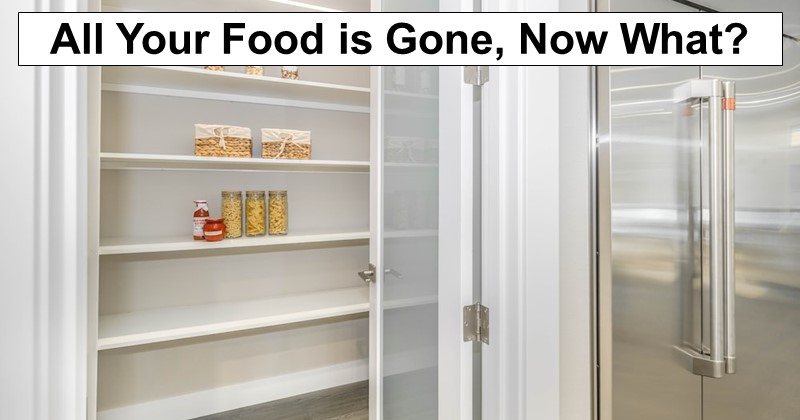As preppers, we often talk about stockpiling food for SHTF scenarios. One of those scenarios is a run on the grocery stores or, worse, a collapse in the supply chain. But a scenario that we fail to fully consider is, “What happens if YOUR food disappears?” The scenario that southernprepper1 lays out in the video below is that, somehow, your food just disappears. Maybe it got stolen while you were away, and your neighbors don’t have any food stockpiled either! Now all you’re left with is whatever you have growing in the garden, animals, and that which can be sourced from nature. Watch the video and then I’ll share my thoughts.
Honestly, this isn’t something I’ve prepared for whatsoever. I’ve always assumed that I will have my food storage, at least until it gets used up. But it’s true that my food storage could just disappear one day. Maybe not due to theft, but a fire sure could ruin the day. So, too, could an infestation of rats or bugs or animals. Maybe you just left it in a bad spot, like a garage exposed to high heat and freezing temperatures. Sure, you thought the cans of food were good, but then they weren’t when you opened them. Now what?
You might assume that you would still be fine. Maybe you hunt, but so do a lot of other people, and then there will be those out attempting such things for the first time. I can only imagine how that will turn out. But do you know how to process whatever you’ve bagged? How about storing it for months? What I can say is this: local deer and other wildlife will be decimated in short order. Then what?
Gardening is wonderful, but it takes time. Most of us couldn’t survive the months of time it takes until those wonderful little potato spuds grow up. And then there’s the problem of having food planted before your food disappeared, seeds stockpiled, watering, weeding, and hoping something (or someone) else didn’t get to your veggies first.
Maybe foraging will be your savior? I don’t know about you, but besides the dandelions that have sprouted up in our front yard, I haven’t a clue what else could be potentially edible, and even then I don’t what to actually do with the dandelions. Maybe I should buy a book about that? But then I would surely get something wrong and end up deathly ill because I picked the wrong mushroom anyway, lol.
Fishing is always a potential option for many of us. My property happens to have a small pond with some bass and whatnot in it, but those fish won’t last long if that’s all we had to rely upon. And I’d imagine the local fishing holes will be knee-deep with other fishermen. But, if this is a problem that only affects you (and possibly your nearby neighbors) then it could be viable; same goes for hunting, I presume.
What is this happens in the winter? We assume such a tragedy would occur when there is a possibility of replenishment, such as by gardening or foraging, but tragedy often strikes when least convenient. I can only assume such a scenario would that much more difficult…maybe impossible.
The truth is that, as much as I prefer not to consider it, losing all (or most) of your food stockpile is a real possibility. At the very least, it will dwindle over time. Then what? You’d best be considering precisely what you’ll do if/when that time comes because, sadly, it may come sooner than you realize.

Leave a Reply